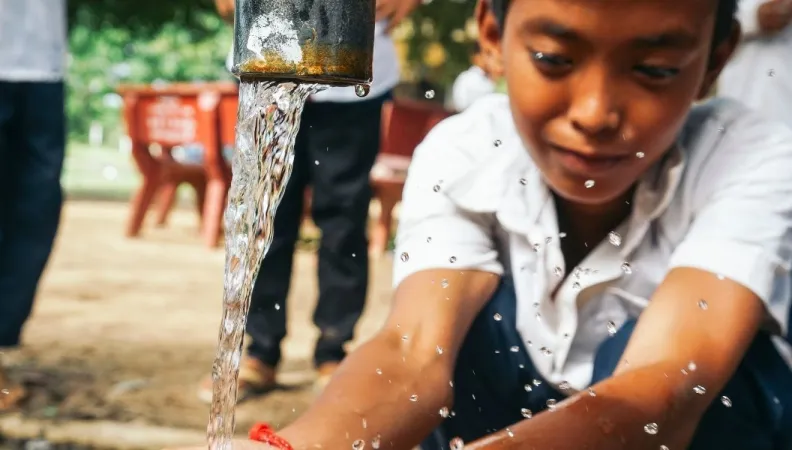Share the page
Water Finance Coalition

The Water Finance Coalition gathers national and international public development banks to improve the financing of the water and sanitation sector. It’s part of an effort to improve people’s quality of life, protect biodiversity, and achieve the Paris Accord objectives, as well as Sustainable Development Goal number 6.
Climate change is also change in the availability of water. The greatest risk of global warming relates to water and the pressure on the quantity and quality of water resources, which poses a threat to human lives and ecosystems. An estimated 2.1 billion people lack access to safe water and 4.1 billion people are still deprived of safely managed sanitation. This lack of service coverage and sustainable water resource management has dramatic consequences on health, gender equality, the economy and the environment. The Covid-19 pandemic is a brutal reminder of the need for such basic services.
The water and sanitation sector remains underfinanced and according to the World Bank, more than USD 110 billion would be necessary every year to achieve safe access to water and sanitation targets. And yet, only one-third of current needs are covered.
There are more than 500 Public Development Banks around the world, operating at national, regional, international and multilateral levels. The volume of activity of these institutions amounts to about USD 2.3 trillion annually – 10 percent of the total amount invested worldwide every year by all public and private sources combined.
Public Development Banks share three characteristics:
- They enjoy independent legal status and financial autonomy
- They are overseen and supported by public entities – usually central or local governments
- They execute a public mandate and address market inconsistences
An initial call for action for a Water Finance Coalition at FICS 1
At the Finance in Common Summit in November, 2020, a call to action was issued to create a Water Finance Coalition. Issued jointly by AFD, CAF (Development Bank of Latin America), EIB (European Investment Bank), the World Bank and SWA (Sanitation and Water for All) , it was a call to improve the financing of water & sanitation in order to achieve SDG 6 and the Paris Accord goals, and to contribute to biodiversity protection.
In 2021, several PDBs have answered the call by engaging in a thematic working group and participating in a study of the financing of SDG 6 by national PDBs, which is now complete.
The Water Finance Coalition gathers international and domestic public development banks, who share in the aim of improving the financing of water and sanitation to achieve SDG 6, the Paris Accord goals and to better protect biodiversity worldwide.
The coalition aims to:
- Animate regular discussions and workshops around challenges raised by the specificity of the sector (sharing experience, good practices and bottlenecks)
- Explore concrete cooperation between domestic and international PDBs
- Investigate:
o How water related investments can contribute to climate adaptation and mitigation policies
o How water related investments can contribute to biodiversity protection
o The extent to which investments in other areas take water issues into account
The working group towards a Water Finance Coalition meets regularly. During its first year of activity the group is chaired by AFD (France) and co-chaired by BANOBRAS (Mexico). The Secretariat of the Working group is managed by IRC (Netherlands).
So far two meetings of the Water Finance Coalition have been held: in February and July 2021, with more than 75 participants in attendance, representing more than 40 institutions, including:
- PDBs: ABDE Brazil, AFD, AFDB, ALIDE, Bancomext Mexico, BANOBRAS Mexico, BDB Brazil, BNA Argentina, BNDES Brazil, BRDE Brazil, CABEI, CAF, CDC Tunisia, CDG Morocco, CDP Italy, COEB, DBSA South Africa, DBZ Zambia, EBRD, FINDETER Colombia, EIB, FIRA Mexico, FonPlata, KfW, IADB, ILLER BANKASI Turkey, India Exim Bank, ICO Spain, IRC Wash, ISDB, NADBANK, NAFIN Mexico, NWB The Netherlands, PT SMI Indonesia, The World Bank
- Non-PDBs: OECD, European Commission, SWA
